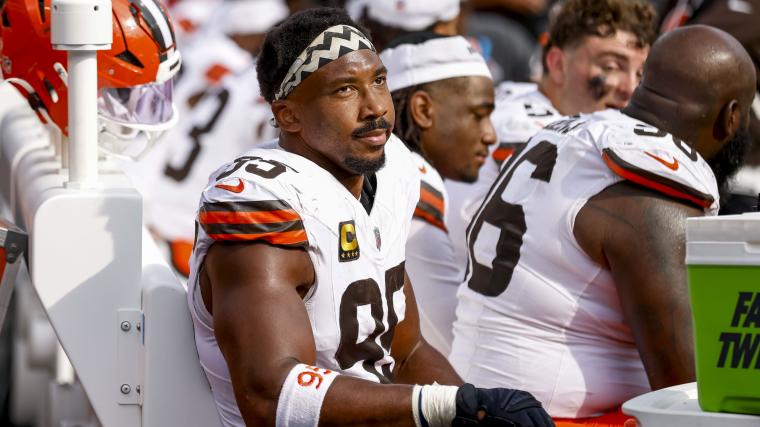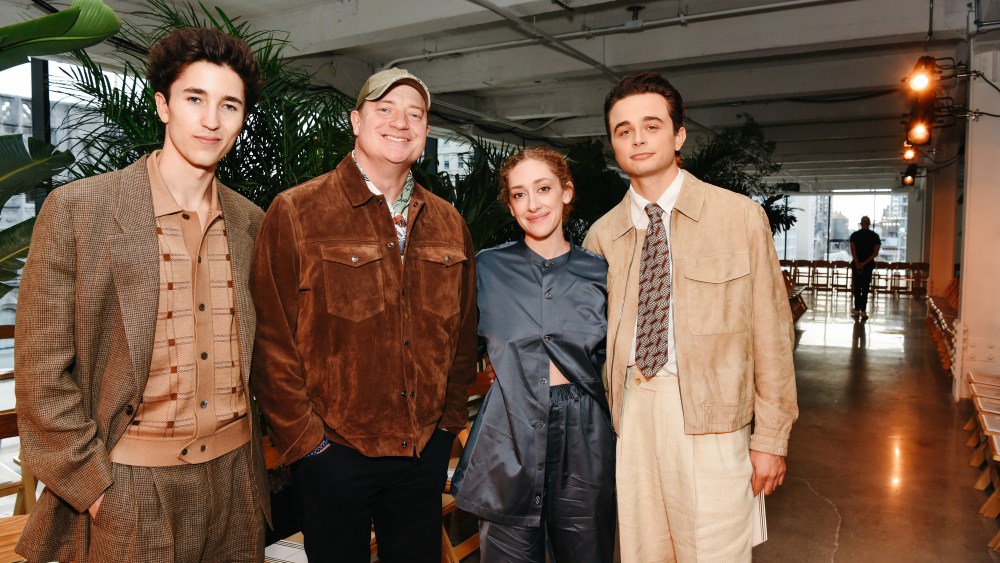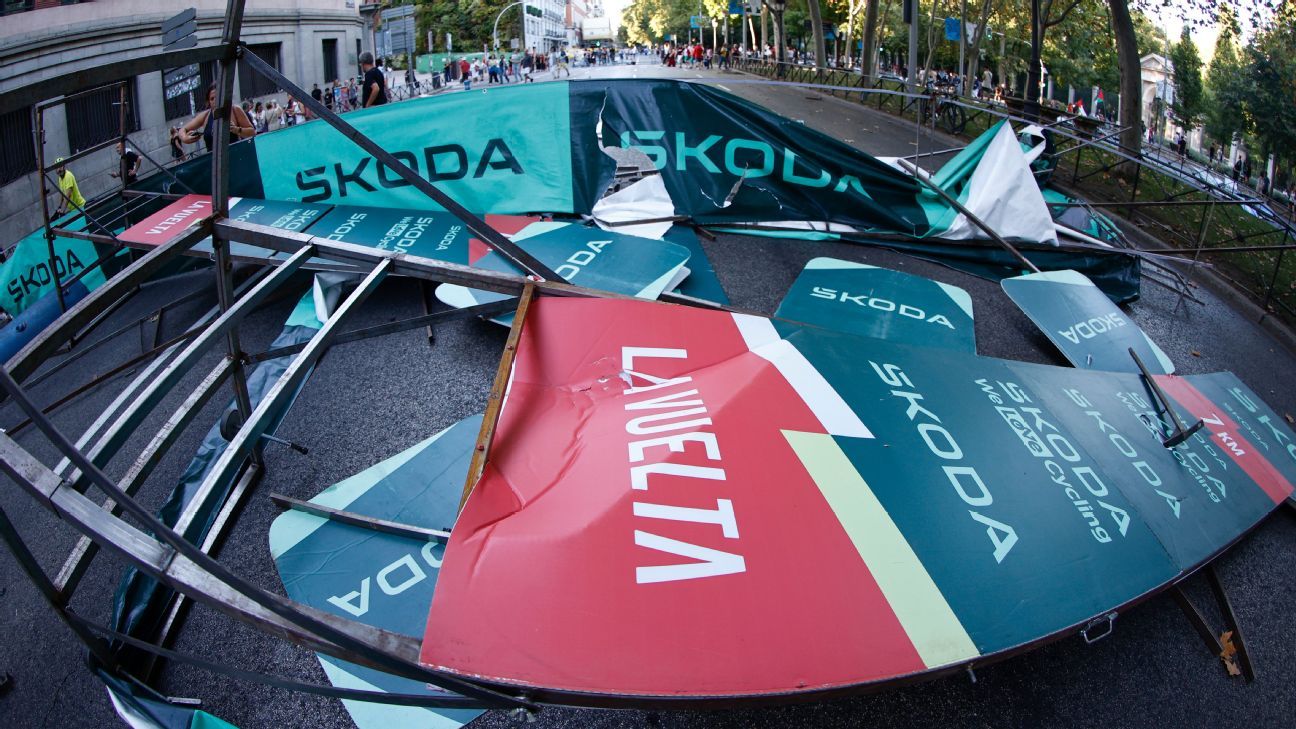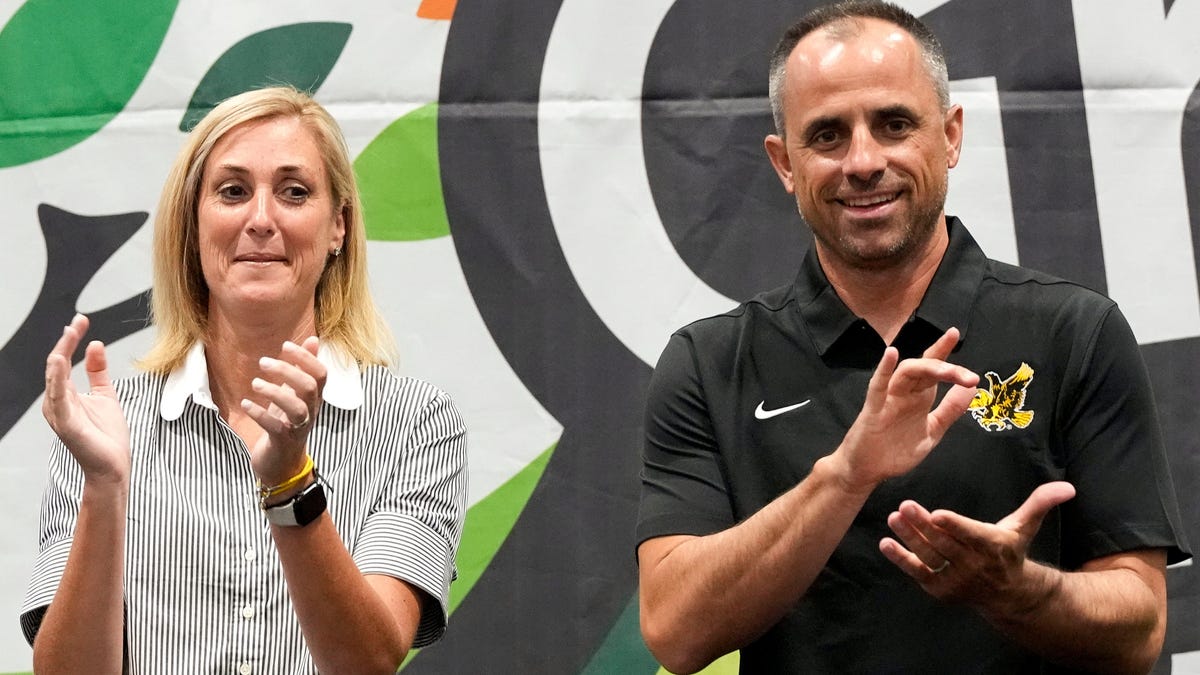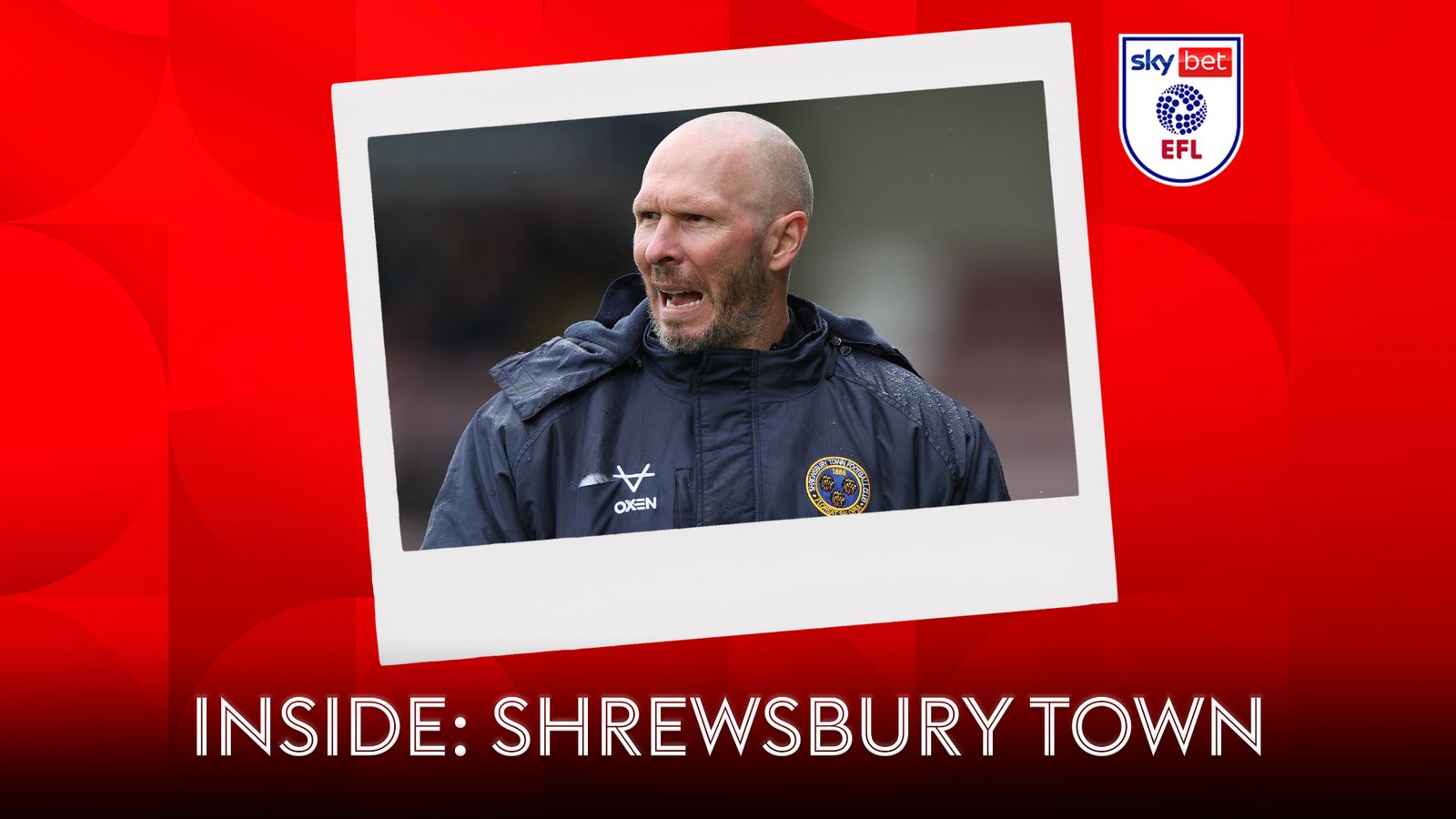
When Michael Appleton took charge of Shrewsbury Town for the first time at Birmingham in March, the situation was bleak. Bottom of the table, they lost 4-1 that day against the backdrop of fans chanting for the exit of director of football Micky Moore.
Relegation duly followed, with Shrewsbury seemingly a ship that could not be turned around. But the summer has brought some hope. The takeover that many crave is not yet forthcoming and Moore has stayed on. But within, the mood is transformed.
Speaking to Moore in an office overlooking the pitch at the stadium, he is in a reflective mood, even if it is painful to look back. “Criticism is never nice. You are on that hamster wheel, just chasing to stay in the league,” he tells Sky Sports. “In the end, it caught up with us.”
Shrewsbury had the lowest budget in League One and the results reflected that. “It was a fantastic achievement to stay there as long as the club did,” says Moore. The difficulty for him is that the downturn in fortunes coincided with his arrival. Mistakes were made.
The club had briefly dreamed of Championship football under the popular Steve Cotterill. But the situation was unsustainable, the club losing three million pounds a year. Moore was hired by owner Roland Wycherley with a remit to bring the costs under control.
“There has been a massive change over the last four or five years in terms of budgets. It had to be scaled back. The last thing you want is to lose the club. But there has been a knock-on effect. We have come through it, but not in the league that we wanted to be in.”
The question of how much of that Moore is responsible for is a thorny one. The man himself concedes that the situation with the supporters “might not be reversible” but is more optimistic about the direction of the club now there is greater clarity over his role.
“The chairman did not want a situation where a new manager comes in, does not like the players, so you get the wheelbarrow out and get a new set.” From the outside, the problem is that one might conclude that this is precisely what Shrewsbury have done.
Moore talks of “starting on a journey” with Matty Taylor but claims the club “came off script and made some emotional decisions” which resulted in pivoting to Paul Hurst, the man who had defied the odds to take Salop to Wembley twice in his previous stint at the club.
“The chairman had a really close relationship with Paul and rightly so given what he achieved, so I totally get it. Paul did an unbelievable job previously so the chairman wanted to bring him back. In hindsight, it probably was not the right time for Paul or for us.”
Speaking to Hurst last summer, he told Sky Sports: “I do not see my role as any different from before, I just have a different title.” For him, the head coach was still the manager. For Moore, that left him sidelined. “I was not doing the role that I was brought in to do.”
He adds: “The chairman came away from the model a little bit. Paul had full control.” But Hurst left in November with Shrewsbury one place off the bottom. Gareth Ainsworth came in and galvanised club and town quickly. “It needed a Gareth type,” argues Moore.
“It needed someone to give everyone a lift and Gareth is very charismatic. He had the whole of Shropshire in the palm of his hand, it was amazing. But then he left.” That jump to Gillingham, in the division below at the time, was a painful low point for Shrewsbury.
This is the context into which Appleton and his assistant Richard O’Donnell arrived in the spring. No wonder Appleton did not like the atmosphere he found, going so far as to describe one display against Northampton as being bad enough to make his skin crawl.
“The big thing that hit us was that there seemed to be an acceptance from the dressing room,” O’Donnell tells Sky Sports. “There was a softness, a lack of identity. That is not us.” Supporters appreciated the honesty, at least, aware of the need for change.
‘We needed an identity’
It was over the course of a seven-hour meeting with Appleton in Manchester that Moore settled on a new course. “After Gareth left, I had already sat down with the chairman and we realised we needed a reset moment here,” he explains. “We needed a clear identity.”
He adds: “We are going to have a clear way of playing now. And we are going to play. We believe we have the right man for that. The atmosphere now is the best it has been since I have been here. Michael has brought that calmness around the training ground.”
O’Donnell’s relationship with Appleton dates back 22 years. O’Donnell was still a teenager when doing his UEFA B Licence at Lilleshall after “picking up a nasty knee injury at Barnsley” – the same injury that brought Appleton’s promising player career to an end.
“We still laugh and joke about how we do not have a good set of knees between us,” says O’Donnell. Coaching gave them both a focus. O’Donnell did his A Licence at 21 and became a youth coach at Hull before Appleton took him with him to Lincoln City.
“He is an unbelievable coach but a fantastic manager as well, not just to the players, but to the staff. He is massive on giving ownership and responsibilities but he makes you fully aware that if you are then responsible for that, you are also accountable for it.
“I think there is a little bit of a persona about him too because it is quite visible that he spends a lot of time in the gym! He has got these tattoos and a skinhead so do not get me wrong, he has got that side to him, trust me, but it does not come out too often.
“He is quite methodical, he is a thinker and he is surprisingly quite calm. He really does analyse the situation before going to it. On the grass, he is really prepared, he knows what he wants and he knows what the outcome is and how we are going to get there.”
Appleton has already raised the standards around the training ground, the little changes that make the difference. “Standards. How you do things on a daily basis?” But the summer recruitment has also been a big factor in changing the culture at Shrewsbury.
“The leaders look very different in our squad now, we have got leaders who are loud and vocal in the dressing room prior to games, we have got leaders who lead by example, we have got leaders who are unbelievable on a daily basis from a standards perspective.”
‘We have got leaders’
Sam Clucas, known to Moore and O’Donnell from previous jobs, brings experience. Tellingly, the trio of centre-backs that the club has brought in this summer – Tom Anderson, Sam Stubbs and Will Boyle – all have League Two promotions on their record.
“We realised that we needed that experience,” says Moore. “We needed to change the environment, to change the mindset. We have brought in leaders, proper characters. It gives you a chance. All of a sudden, instead of one or two leaders, we have six, seven, eight.”
Alongside this, Shrewsbury know that they have to develop young talent of their own. “We need to do that. We have created a pathway with the youth team. I want the fans to see some of their own. Michael’s expertise has always been developing young players.”
At Lincoln, in particular, he played a part in helping Morgan Rogers, Brennan Johnson and Brooke Norton-Cuffy on their way to top-level football. The hope is that by adopting a more expansive game, Shrewsbury can become an attractive proposition for players again.
“If your style of play is good, you can pick up those players who are released from the bigger clubs. And if you have younger players doing well at this level then you have half a chance of selling them on. That steady income stream, it can be big for a club like us.”
O’Donnell believes that they can deliver on the style front. “We definitely want to be more possession-based, get into scoring areas, get final-third entries. We want the fans to see our identity. Players that come to us will be given the freedom to go out and play.”
There is a plan, then. Shrewsbury, surely, just need to stick to it now. “If you keep jumping from one contrasting style to another, I do not think anyone has stability,” adds O’Donnell. “The club needs an identity. And they will see some positive, attractive football, for sure.
“It has been a difficult few years for the club but we are keen to put all that behind us. Everybody is singing from the same hymn sheet with a real belief and an understanding that while it is not going to happen overnight, we are backing ourselves to succeed.”
‘Better brand of football’
Will that be enough? There is an awareness that the previous two teams to finish last in League One were relegated again the next season. Shrewsbury go into this campaign with a bottom-half budget, the search for a new owner ongoing. But Moore is hopeful.
“We still have to manage expectations but we want the fans to be excited. The challenge is to outperform the budget. It can be done. I do not know where we will finish, but we will definitely play a brand of football that is better than what the supporters have seen before.
For the much-maligned Moore, things, belatedly, are taking shape. “I cannot change yesterday. I can only affect tomorrow. I do not know what the future holds, whether the chairman is going to sell or get investment. It could all change. I might not be here.
“But I want to leave solid foundations and I take full accountability of the situation now and the signings that we are making under Michael. I sleep easy at night knowing that the things I wanted to do are in place now. Sometimes, all it takes is that reset moment.”
Watch the EFL on Sky Sports
There are over 1,000 of the EFL’s 1,891 games across the EFL, Carabao Cup and Vertu Trophy that will be broadcast on Sky Sports throughout the season and not only that, but every one of the 72 EFL Clubs are to be featured live on Sky more than 20 times next season.
And it is also important to remember that:
Matches will be broadcast live across existing Sky Sports channels or on Sky Sports+
Every EFL match which is shown on Sky Sports will also be available on the Sky Sports app 📱.
Not got Sky? Watch the EFL without a contract on NOW.
#Shrewsbury #Town #Reset #moment #Michael #Appleton #Salop #find #identity #relegation #Football #News






